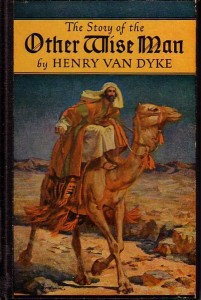 When we were kids, my father used to read us A Christmas Carol aloud, a stave each night, while my mother baked Christmas cookies in the kitchen. By the time we were teenagers, though, we had too much to do, and too little patience, for this nightly ritual. We all liked the idea of it, but we seldom had the time to sit down, calm our racing minds, and just listen.
When we were kids, my father used to read us A Christmas Carol aloud, a stave each night, while my mother baked Christmas cookies in the kitchen. By the time we were teenagers, though, we had too much to do, and too little patience, for this nightly ritual. We all liked the idea of it, but we seldom had the time to sit down, calm our racing minds, and just listen.
Dad understood that, and he would have liked to read us another, shorter book instead: The Story of the Other Wise Man, by Henry Van Dyke. He really loved this book, but it wasn’t as comfortingly familiar as A Christmas Carol, and Van Dyke’s flowery, roundabout Victorian style had us nodding off after the first page, so we never did make it all the way through it.
Last year, on Christmas morning, I read the book for the first time. I wish I hadn’t waited so long. Buried in all that description is a really lovely Christmas story, one that closely parallels my father’s life and the lessons I learned from taking care of him in his last years.
The Bible doesn’t specify the number of wise men, but three gifts are mentioned, so the tradition has sprung up that there were three. Van Dyke adds a fourth, one who never actually gets to Bethlehem because he keeps getting derailed along the way. Artaban has sold his home and all his belongings and used the money to buy three jewels, which he plans to present to the infant Messiah. He starts out behind the original three magi and is further delayed when he stops to help a sick man, giving him one of the jewels to pay for his care. Tagging even further behind, he gets caught up in Herod’s slaughter of the innocents and pays the second jewel as a bribe to spare a baby’s life. He wanders through Egypt, looking for clues to the Messiah’s whereabouts. Along the way he ministers to the poor and hungry, as the one thing that everyone tells him is that he won’t find this new king among the rich and powerful.
Finally he winds up in Jerusalem just as the Passion is occurring, and he resolves he will use the last jewel to ransom Jesus from the cross. As he is heading to Golgotha, though he encounters a young girl who is about to be sold into slavery and… well, you know how this is going to end. Artaban dies without ever seeing the Messiah, except, of course, that he has been seeing the Messiah all along.
Van Dyke has a great story here, but he wraps it in 19th-century Orientalism, using flowery language to describe a mix of real and fictitious religion, history, and geography. A 21st-century editor would cut almost all of it out, and the book would be better for it to the modern reader, but I have to say that Dad did relish the descriptions.
Even more, he liked what the story said. It was a lesson Dad spent his life teaching us, through word and example, and I would like to think that it has stuck. Some days, I describe my life as a series of distractions punctuated by interruptions—caring for young children and old people certainly seems to be that way. This story is a helpful reminder that sometimes, the interruptions are the point.